Analysis of Kokotovich Constructions Pty Ltd & Ors v Wallington Case
VerifiedAdded on 2021/06/14
|10
|887
|280
Case Study
AI Summary
This case study analyzes the Kokotovich Constructions Pty Ltd & Ors v Wallington case, focusing on the breach of directors' fiduciary duties under the Corporations Act 2001 (Cth). The case involves Mr. Kokotovich's actions in allocating shares to devalue Mrs. Wallington's shares, leading to a breach of sections 181 and 182 of the Act. The Court of Appeal upheld the original judgment, emphasizing the importance of directors acting in good faith and for the benefit of the company. The analysis examines the facts, infringement of duties, court's decision, and the relevance of the case in highlighting the significance of directors' fiduciary responsibilities and the potential consequences of breaching them, including the winding up of the company. The case underscores that directors must use their powers appropriately and make decisions in the best interests of the corporation, rather than for personal gain.

BUSINESS AND
CORPORATIONS
LAW
KOKOTOVICH CONSTRUCTIONS PTY LTD & ORS V
WALLINGTON (1995) 13 ACLC 1113
CORPORATIONS
LAW
KOKOTOVICH CONSTRUCTIONS PTY LTD & ORS V
WALLINGTON (1995) 13 ACLC 1113
Paraphrase This Document
Need a fresh take? Get an instant paraphrase of this document with our AI Paraphraser
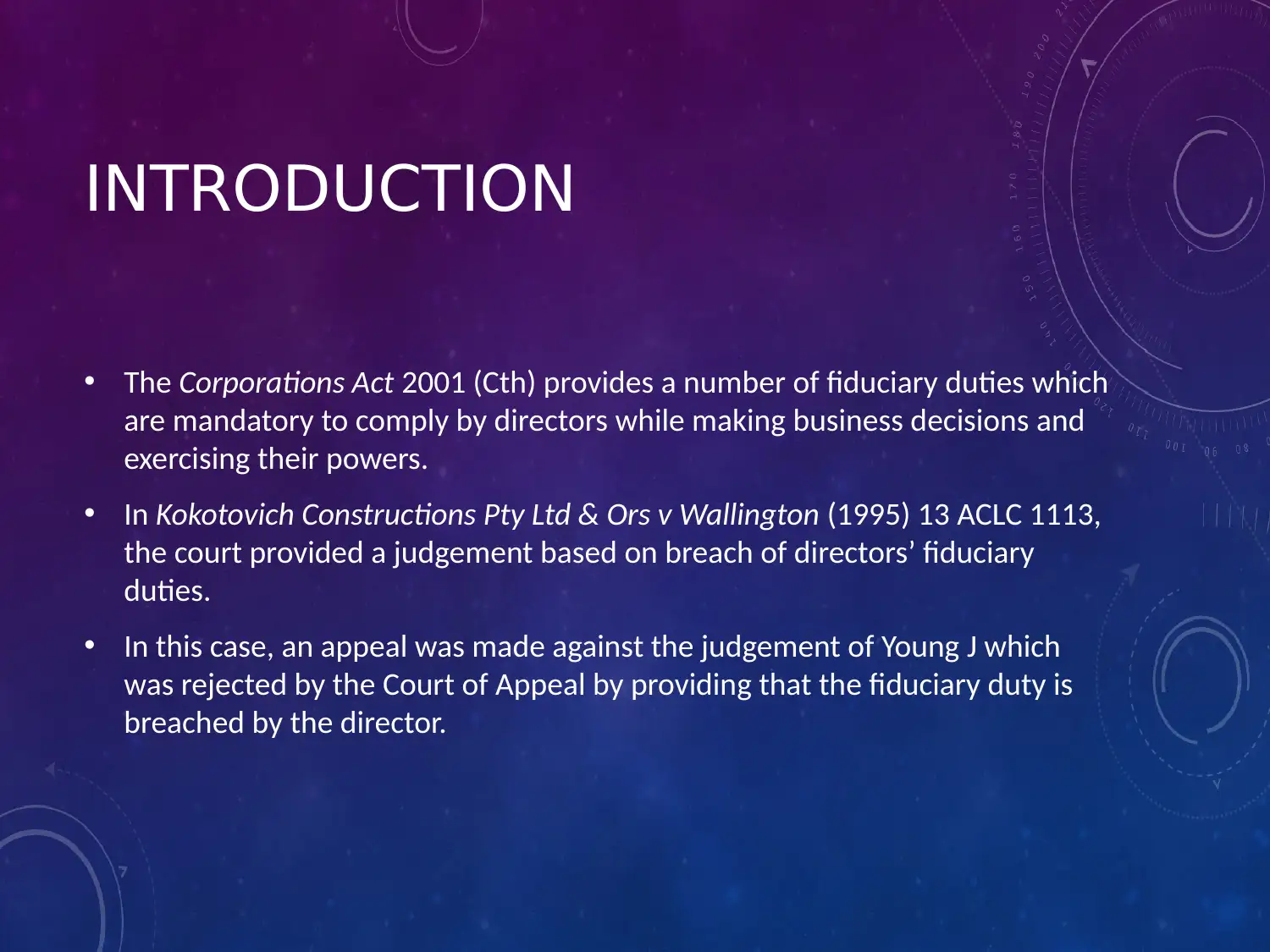
INTRODUCTION
• The Corporations Act 2001 (Cth) provides a number of fiduciary duties which
are mandatory to comply by directors while making business decisions and
exercising their powers.
• In Kokotovich Constructions Pty Ltd & Ors v Wallington (1995) 13 ACLC 1113,
the court provided a judgement based on breach of directors’ fiduciary
duties.
• In this case, an appeal was made against the judgement of Young J which
was rejected by the Court of Appeal by providing that the fiduciary duty is
breached by the director.
• The Corporations Act 2001 (Cth) provides a number of fiduciary duties which
are mandatory to comply by directors while making business decisions and
exercising their powers.
• In Kokotovich Constructions Pty Ltd & Ors v Wallington (1995) 13 ACLC 1113,
the court provided a judgement based on breach of directors’ fiduciary
duties.
• In this case, an appeal was made against the judgement of Young J which
was rejected by the Court of Appeal by providing that the fiduciary duty is
breached by the director.
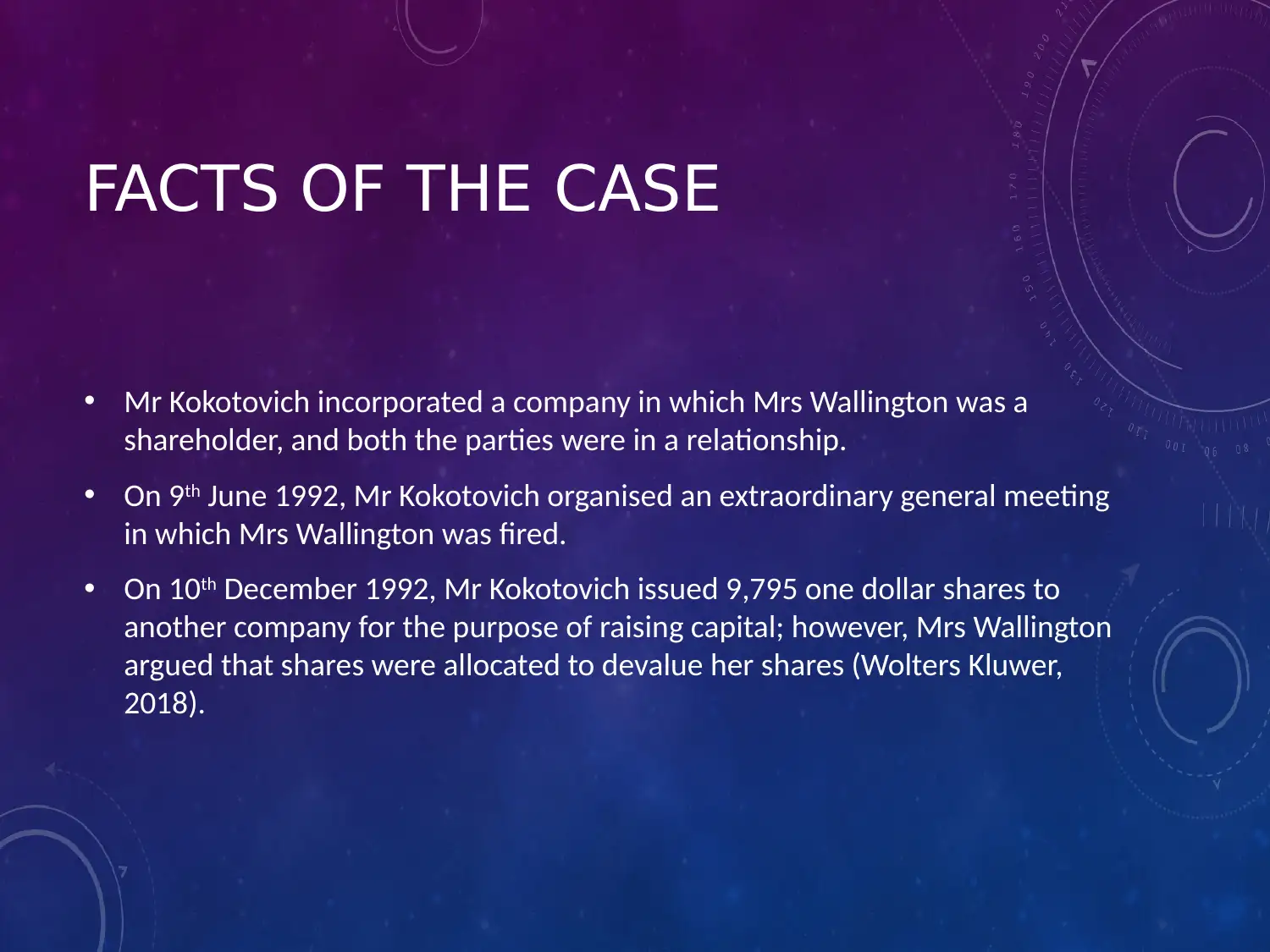
FACTS OF THE CASE
• Mr Kokotovich incorporated a company in which Mrs Wallington was a
shareholder, and both the parties were in a relationship.
• On 9th June 1992, Mr Kokotovich organised an extraordinary general meeting
in which Mrs Wallington was fired.
• On 10th December 1992, Mr Kokotovich issued 9,795 one dollar shares to
another company for the purpose of raising capital; however, Mrs Wallington
argued that shares were allocated to devalue her shares (Wolters Kluwer,
2018).
• Mr Kokotovich incorporated a company in which Mrs Wallington was a
shareholder, and both the parties were in a relationship.
• On 9th June 1992, Mr Kokotovich organised an extraordinary general meeting
in which Mrs Wallington was fired.
• On 10th December 1992, Mr Kokotovich issued 9,795 one dollar shares to
another company for the purpose of raising capital; however, Mrs Wallington
argued that shares were allocated to devalue her shares (Wolters Kluwer,
2018).
⊘ This is a preview!⊘
Do you want full access?
Subscribe today to unlock all pages.

Trusted by 1+ million students worldwide
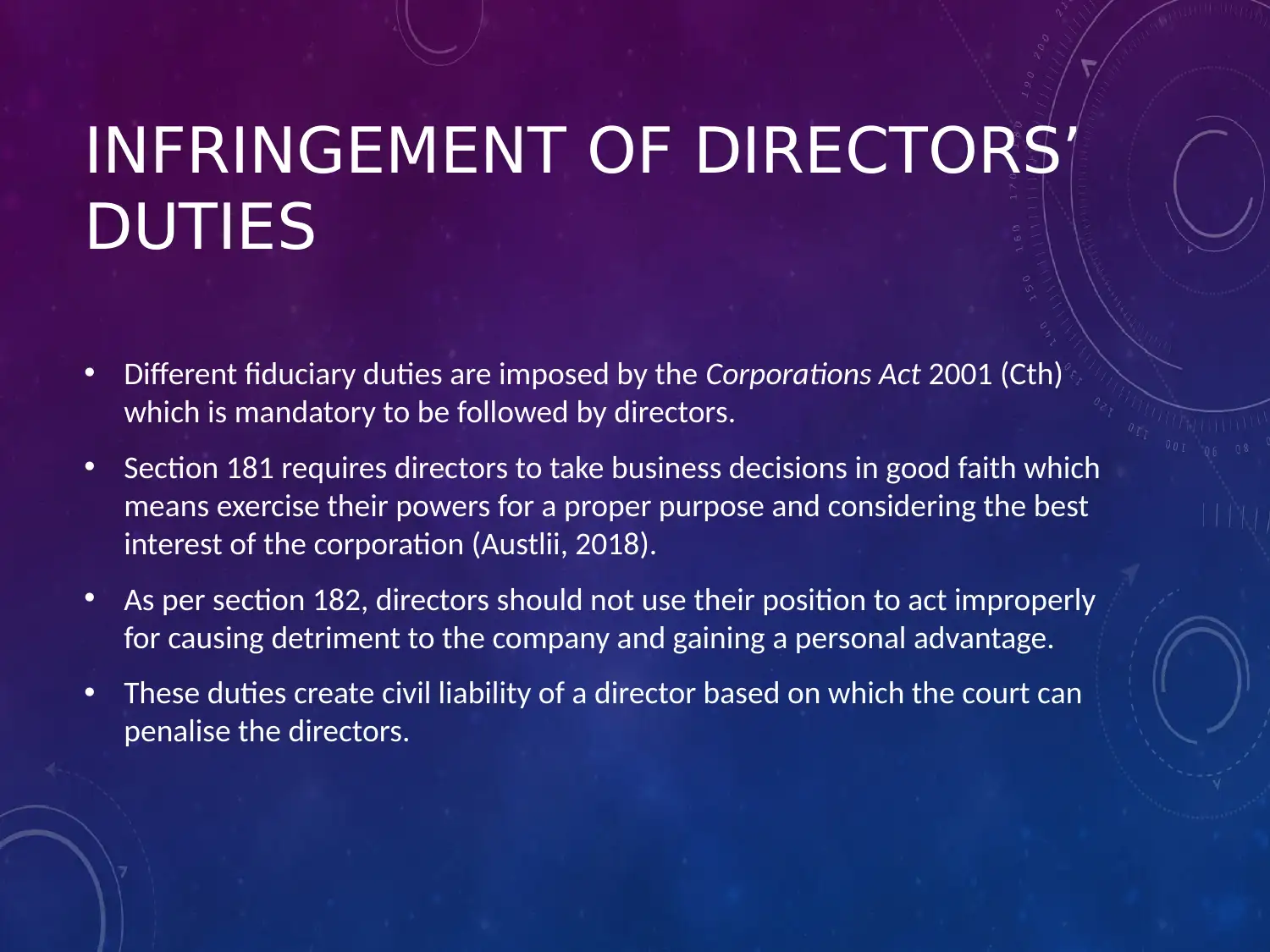
INFRINGEMENT OF DIRECTORS’
DUTIES
• Different fiduciary duties are imposed by the Corporations Act 2001 (Cth)
which is mandatory to be followed by directors.
• Section 181 requires directors to take business decisions in good faith which
means exercise their powers for a proper purpose and considering the best
interest of the corporation (Austlii, 2018).
• As per section 182, directors should not use their position to act improperly
for causing detriment to the company and gaining a personal advantage.
• These duties create civil liability of a director based on which the court can
penalise the directors.
DUTIES
• Different fiduciary duties are imposed by the Corporations Act 2001 (Cth)
which is mandatory to be followed by directors.
• Section 181 requires directors to take business decisions in good faith which
means exercise their powers for a proper purpose and considering the best
interest of the corporation (Austlii, 2018).
• As per section 182, directors should not use their position to act improperly
for causing detriment to the company and gaining a personal advantage.
• These duties create civil liability of a director based on which the court can
penalise the directors.
Paraphrase This Document
Need a fresh take? Get an instant paraphrase of this document with our AI Paraphraser
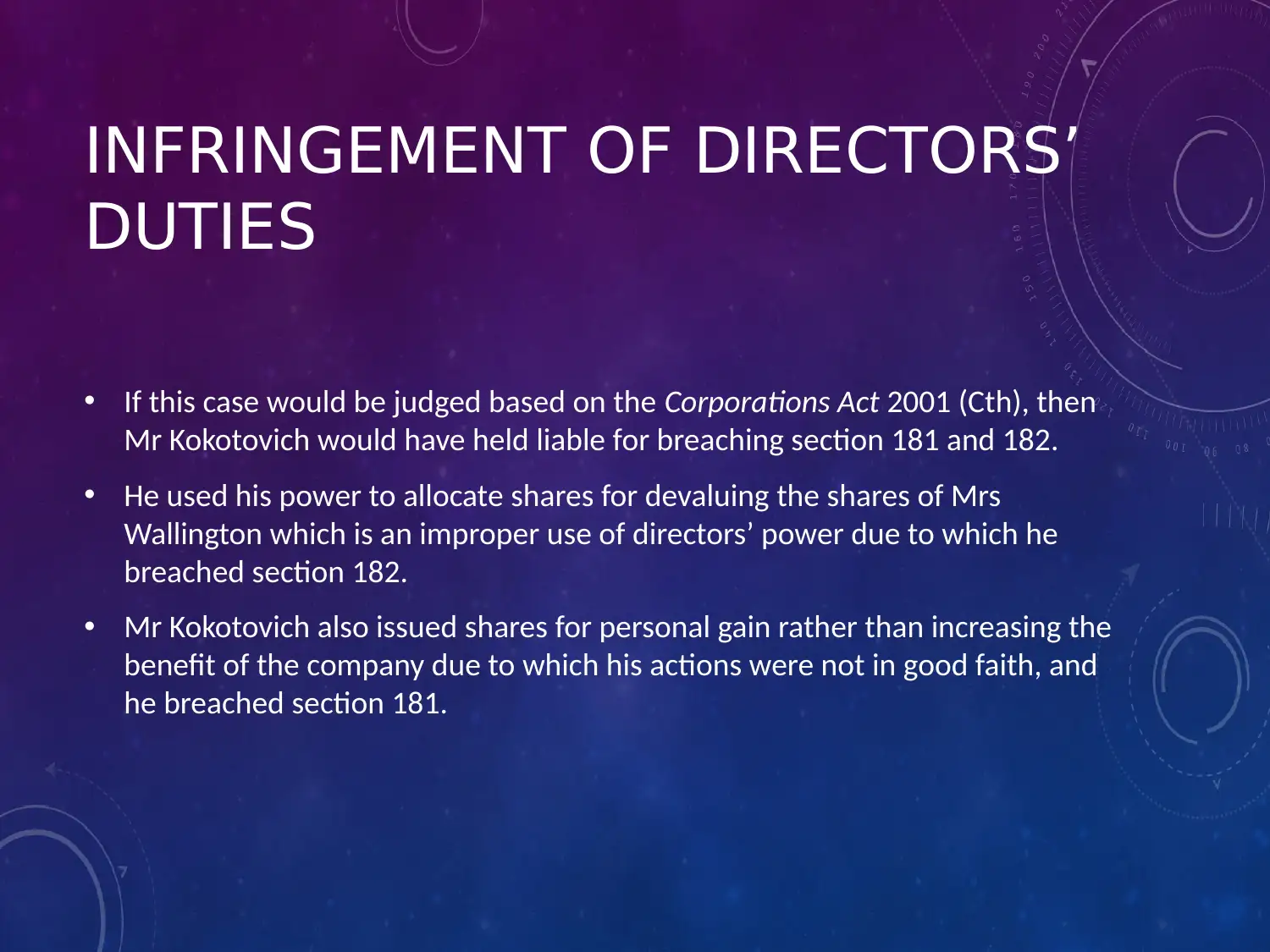
INFRINGEMENT OF DIRECTORS’
DUTIES
• If this case would be judged based on the Corporations Act 2001 (Cth), then
Mr Kokotovich would have held liable for breaching section 181 and 182.
• He used his power to allocate shares for devaluing the shares of Mrs
Wallington which is an improper use of directors’ power due to which he
breached section 182.
• Mr Kokotovich also issued shares for personal gain rather than increasing the
benefit of the company due to which his actions were not in good faith, and
he breached section 181.
DUTIES
• If this case would be judged based on the Corporations Act 2001 (Cth), then
Mr Kokotovich would have held liable for breaching section 181 and 182.
• He used his power to allocate shares for devaluing the shares of Mrs
Wallington which is an improper use of directors’ power due to which he
breached section 182.
• Mr Kokotovich also issued shares for personal gain rather than increasing the
benefit of the company due to which his actions were not in good faith, and
he breached section 181.
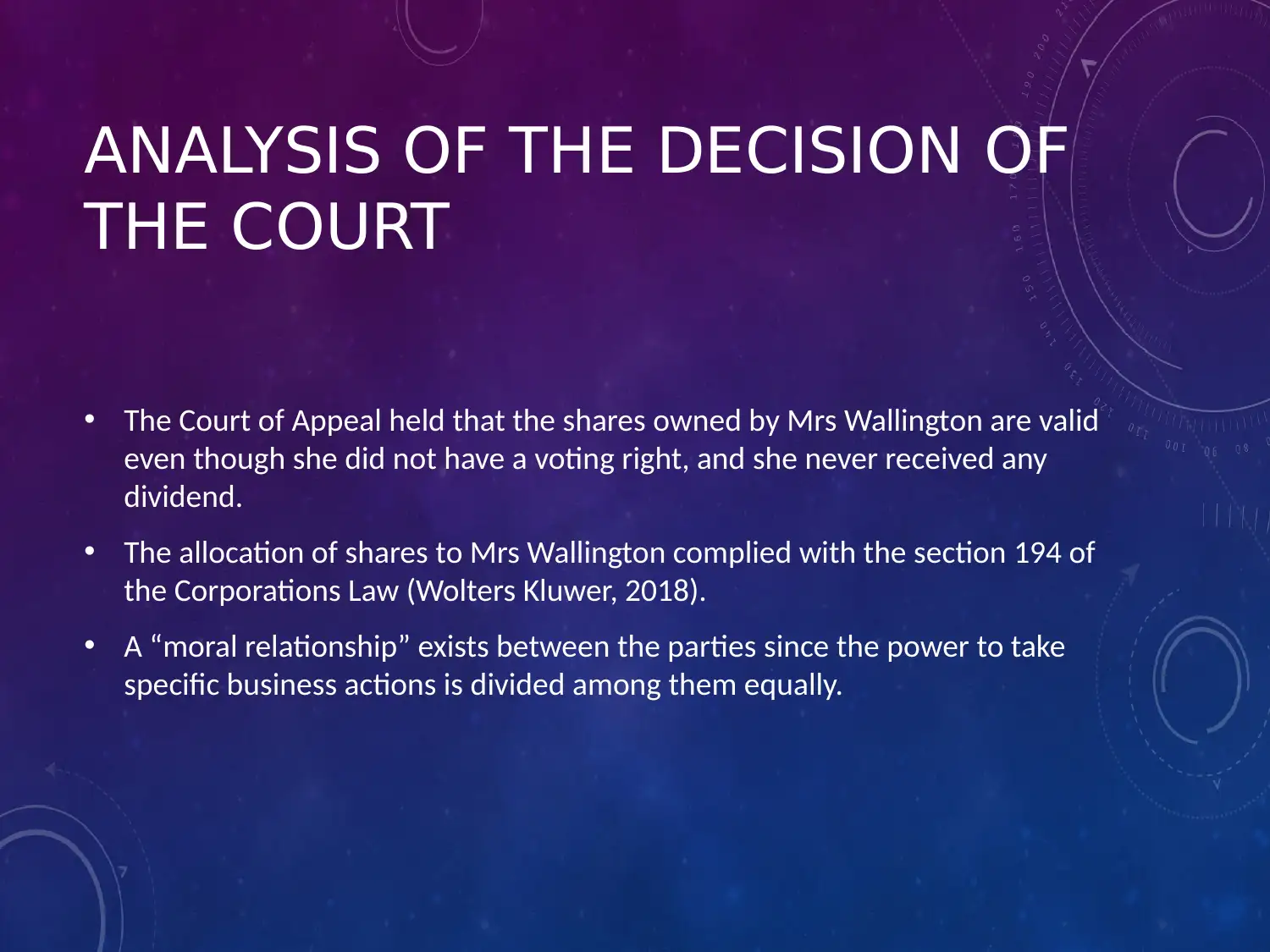
ANALYSIS OF THE DECISION OF
THE COURT
• The Court of Appeal held that the shares owned by Mrs Wallington are valid
even though she did not have a voting right, and she never received any
dividend.
• The allocation of shares to Mrs Wallington complied with the section 194 of
the Corporations Law (Wolters Kluwer, 2018).
• A “moral relationship” exists between the parties since the power to take
specific business actions is divided among them equally.
THE COURT
• The Court of Appeal held that the shares owned by Mrs Wallington are valid
even though she did not have a voting right, and she never received any
dividend.
• The allocation of shares to Mrs Wallington complied with the section 194 of
the Corporations Law (Wolters Kluwer, 2018).
• A “moral relationship” exists between the parties since the power to take
specific business actions is divided among them equally.
⊘ This is a preview!⊘
Do you want full access?
Subscribe today to unlock all pages.

Trusted by 1+ million students worldwide
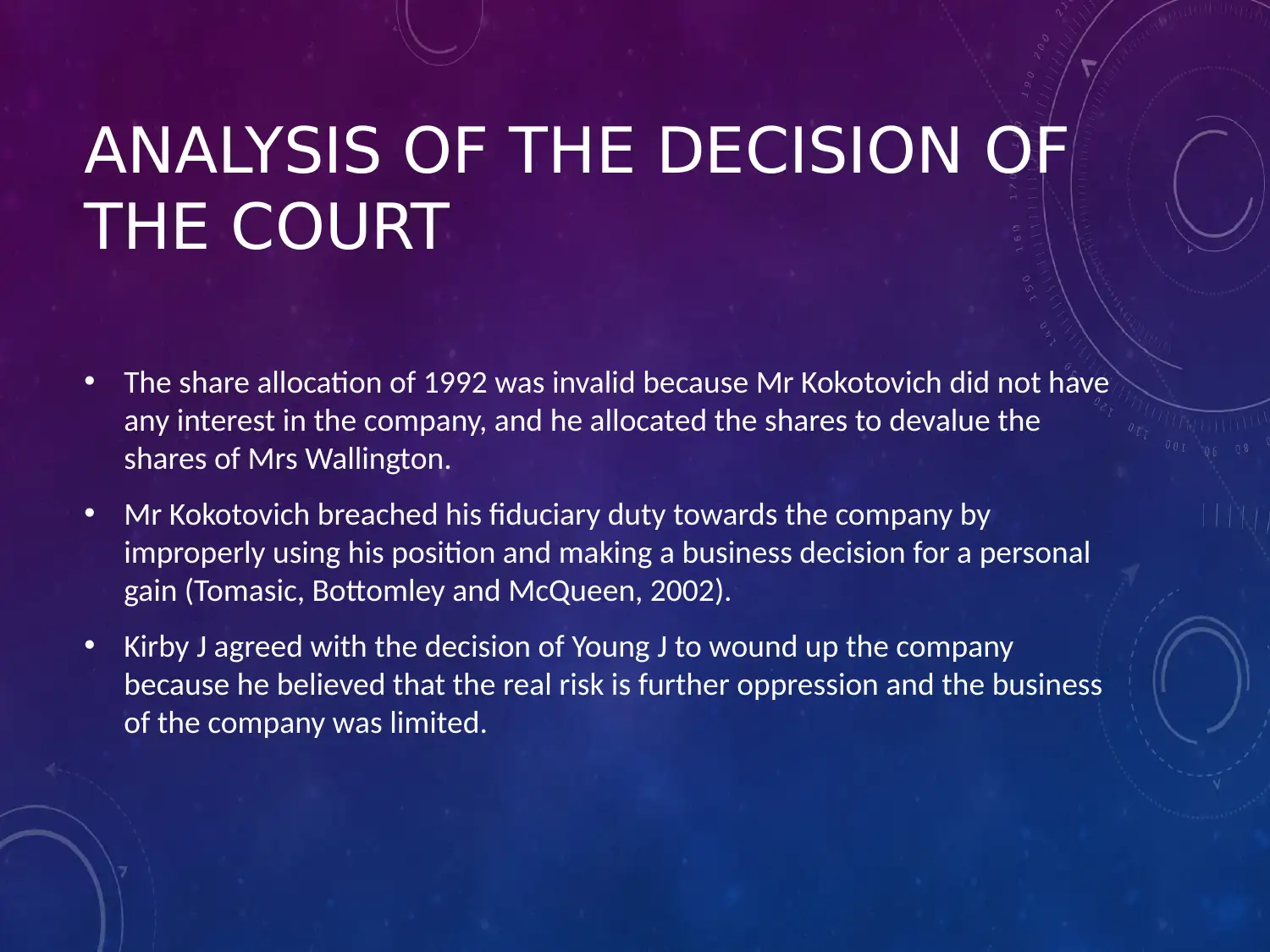
ANALYSIS OF THE DECISION OF
THE COURT
• The share allocation of 1992 was invalid because Mr Kokotovich did not have
any interest in the company, and he allocated the shares to devalue the
shares of Mrs Wallington.
• Mr Kokotovich breached his fiduciary duty towards the company by
improperly using his position and making a business decision for a personal
gain (Tomasic, Bottomley and McQueen, 2002).
• Kirby J agreed with the decision of Young J to wound up the company
because he believed that the real risk is further oppression and the business
of the company was limited.
THE COURT
• The share allocation of 1992 was invalid because Mr Kokotovich did not have
any interest in the company, and he allocated the shares to devalue the
shares of Mrs Wallington.
• Mr Kokotovich breached his fiduciary duty towards the company by
improperly using his position and making a business decision for a personal
gain (Tomasic, Bottomley and McQueen, 2002).
• Kirby J agreed with the decision of Young J to wound up the company
because he believed that the real risk is further oppression and the business
of the company was limited.
Paraphrase This Document
Need a fresh take? Get an instant paraphrase of this document with our AI Paraphraser
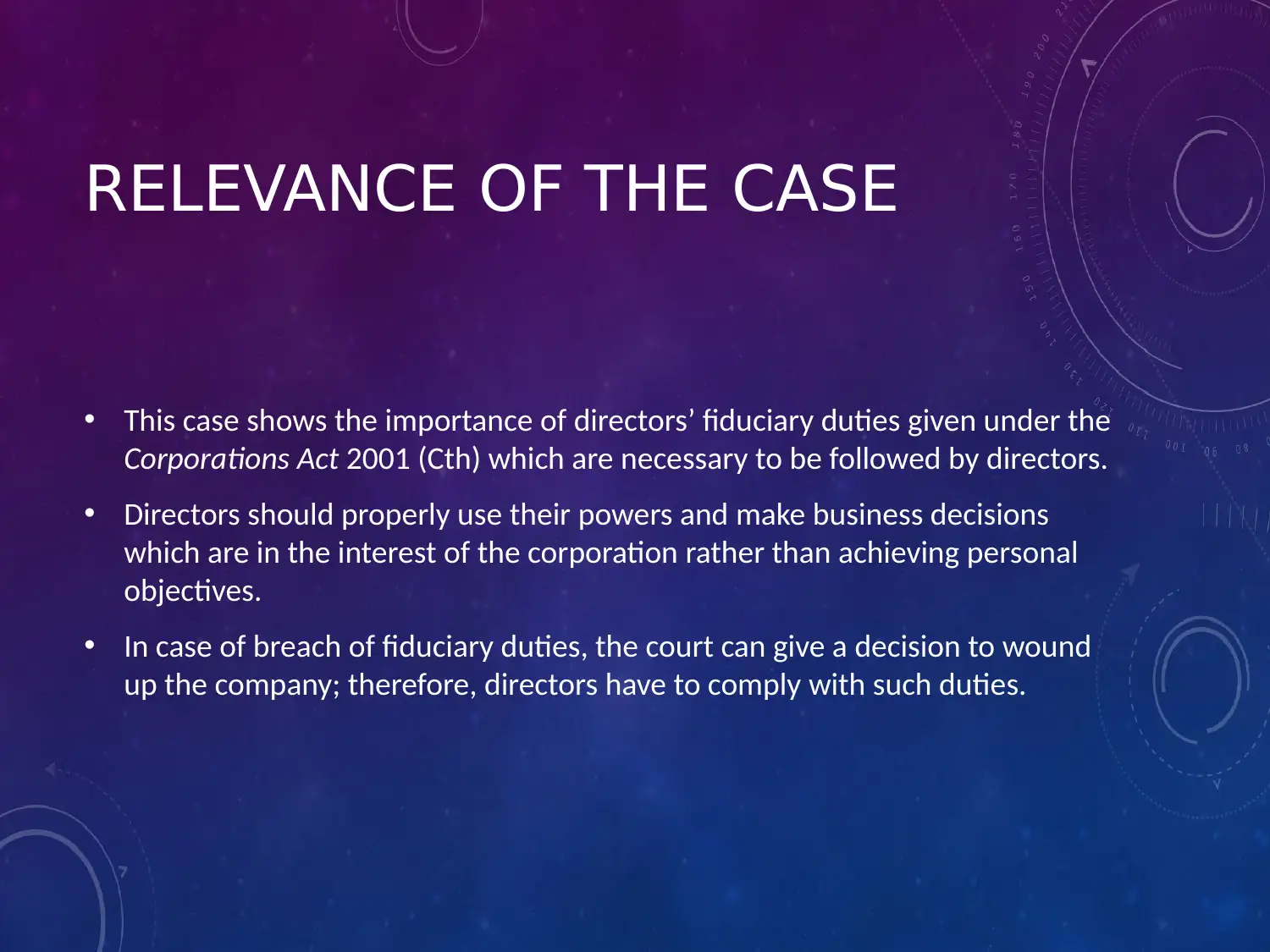
RELEVANCE OF THE CASE
• This case shows the importance of directors’ fiduciary duties given under the
Corporations Act 2001 (Cth) which are necessary to be followed by directors.
• Directors should properly use their powers and make business decisions
which are in the interest of the corporation rather than achieving personal
objectives.
• In case of breach of fiduciary duties, the court can give a decision to wound
up the company; therefore, directors have to comply with such duties.
• This case shows the importance of directors’ fiduciary duties given under the
Corporations Act 2001 (Cth) which are necessary to be followed by directors.
• Directors should properly use their powers and make business decisions
which are in the interest of the corporation rather than achieving personal
objectives.
• In case of breach of fiduciary duties, the court can give a decision to wound
up the company; therefore, directors have to comply with such duties.
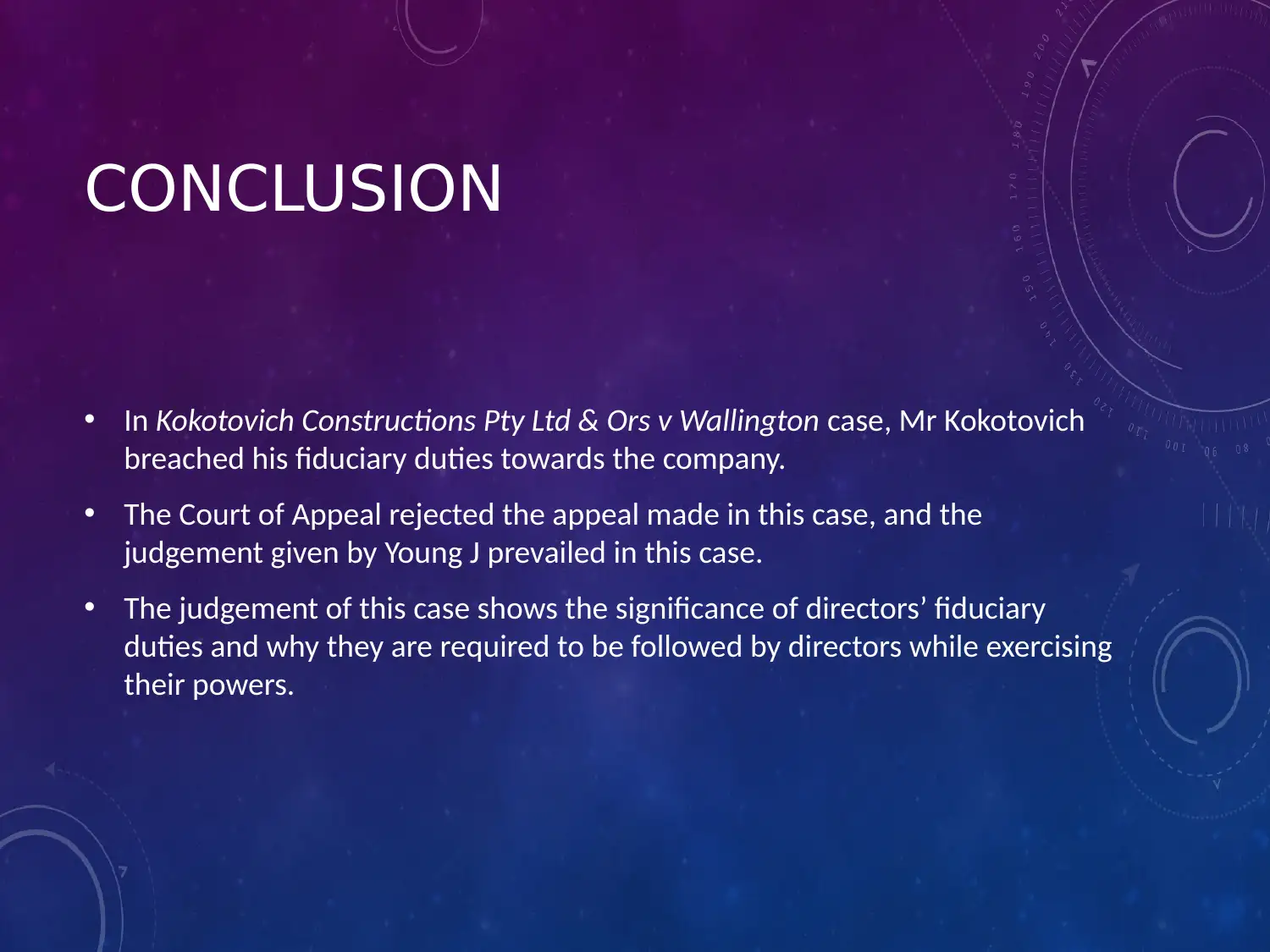
CONCLUSION
• In Kokotovich Constructions Pty Ltd & Ors v Wallington case, Mr Kokotovich
breached his fiduciary duties towards the company.
• The Court of Appeal rejected the appeal made in this case, and the
judgement given by Young J prevailed in this case.
• The judgement of this case shows the significance of directors’ fiduciary
duties and why they are required to be followed by directors while exercising
their powers.
• In Kokotovich Constructions Pty Ltd & Ors v Wallington case, Mr Kokotovich
breached his fiduciary duties towards the company.
• The Court of Appeal rejected the appeal made in this case, and the
judgement given by Young J prevailed in this case.
• The judgement of this case shows the significance of directors’ fiduciary
duties and why they are required to be followed by directors while exercising
their powers.
⊘ This is a preview!⊘
Do you want full access?
Subscribe today to unlock all pages.

Trusted by 1+ million students worldwide
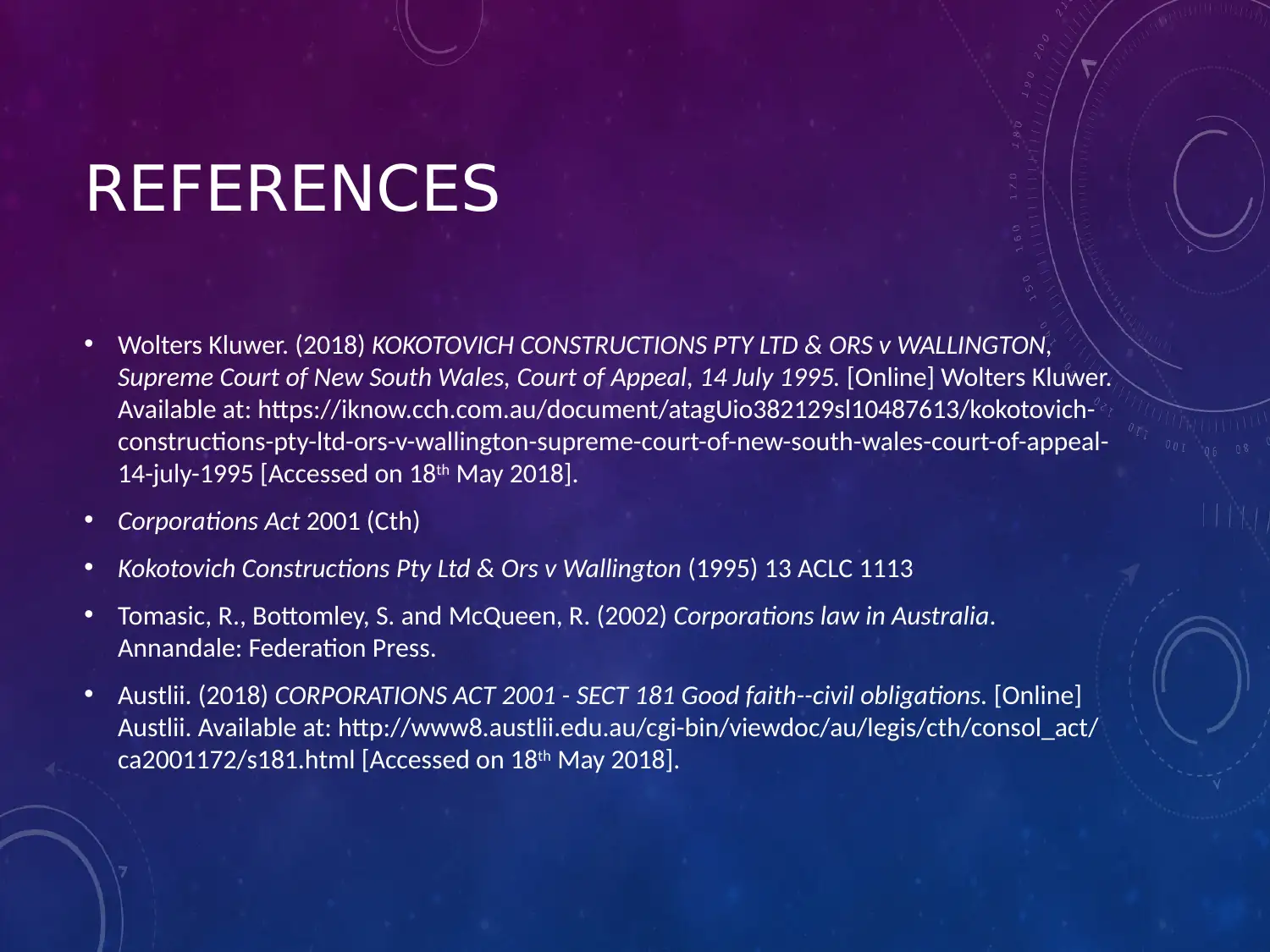
REFERENCES
• Wolters Kluwer. (2018) KOKOTOVICH CONSTRUCTIONS PTY LTD & ORS v WALLINGTON,
Supreme Court of New South Wales, Court of Appeal, 14 July 1995. [Online] Wolters Kluwer.
Available at: https://iknow.cch.com.au/document/atagUio382129sl10487613/kokotovich-
constructions-pty-ltd-ors-v-wallington-supreme-court-of-new-south-wales-court-of-appeal-
14-july-1995 [Accessed on 18th May 2018].
• Corporations Act 2001 (Cth)
• Kokotovich Constructions Pty Ltd & Ors v Wallington (1995) 13 ACLC 1113
• Tomasic, R., Bottomley, S. and McQueen, R. (2002) Corporations law in Australia.
Annandale: Federation Press.
• Austlii. (2018) CORPORATIONS ACT 2001 - SECT 181 Good faith--civil obligations. [Online]
Austlii. Available at: http://www8.austlii.edu.au/cgi-bin/viewdoc/au/legis/cth/consol_act/
ca2001172/s181.html [Accessed on 18th May 2018].
• Wolters Kluwer. (2018) KOKOTOVICH CONSTRUCTIONS PTY LTD & ORS v WALLINGTON,
Supreme Court of New South Wales, Court of Appeal, 14 July 1995. [Online] Wolters Kluwer.
Available at: https://iknow.cch.com.au/document/atagUio382129sl10487613/kokotovich-
constructions-pty-ltd-ors-v-wallington-supreme-court-of-new-south-wales-court-of-appeal-
14-july-1995 [Accessed on 18th May 2018].
• Corporations Act 2001 (Cth)
• Kokotovich Constructions Pty Ltd & Ors v Wallington (1995) 13 ACLC 1113
• Tomasic, R., Bottomley, S. and McQueen, R. (2002) Corporations law in Australia.
Annandale: Federation Press.
• Austlii. (2018) CORPORATIONS ACT 2001 - SECT 181 Good faith--civil obligations. [Online]
Austlii. Available at: http://www8.austlii.edu.au/cgi-bin/viewdoc/au/legis/cth/consol_act/
ca2001172/s181.html [Accessed on 18th May 2018].
1 out of 10
Related Documents
Your All-in-One AI-Powered Toolkit for Academic Success.
+13062052269
info@desklib.com
Available 24*7 on WhatsApp / Email
![[object Object]](/_next/static/media/star-bottom.7253800d.svg)
Unlock your academic potential
Copyright © 2020–2026 A2Z Services. All Rights Reserved. Developed and managed by ZUCOL.




![ASIC v Maxwell & Ors [2006] NSWSC 1052 Case: Corporations Law Analysis](/_next/image/?url=https%3A%2F%2Fdesklib.com%2Fmedia%2Fimages%2Fry%2F57e8c573017544d2978be5debb1abc0d.jpg&w=256&q=75)
